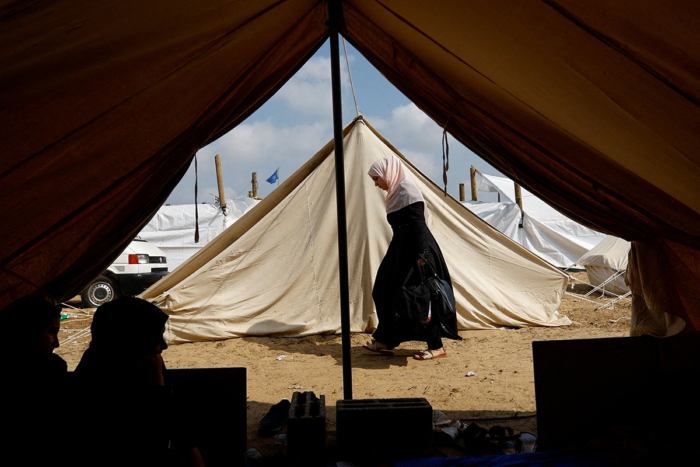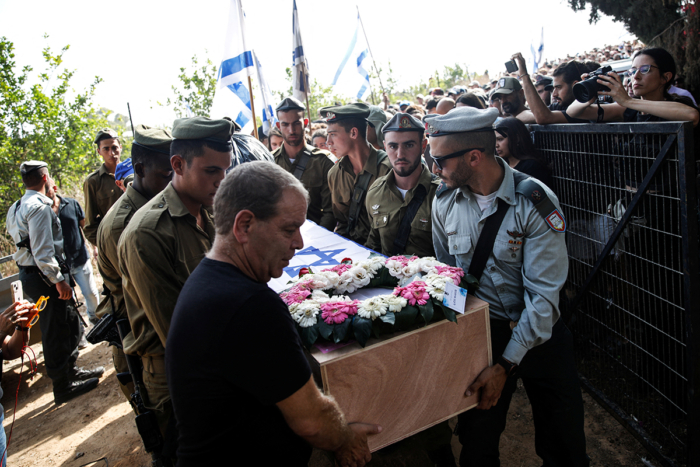Anglican leaders call for global support of Diocese of Jerusalem’s ministries as war intensifiesPosted Oct 24, 2023 |
|

A woman walks past tents Oct. 23, as Palestinians, who fled their houses amid Israeli strikes, take shelter in a camp at a United Nations-run center. Photo: Reuters
[Episcopal News Service] Archbishop of Canterbury Justin Welby has joined with Archbishop Hosam Naoum in issuing a global appeal for support of Anglican ministries in the Holy Land as the war between Israel and Hamas intensifies.
Welby and Naoum issued parallel written statements on Oct. 24 lamenting the recent violence, including damage to an Anglican hospital in Gaza, while urging Anglicans to pray for and donate to the Episcopal Diocese of Jerusalem. They listed several global partners that are accepting donations on the diocese’s behalf, including the American Friends of the Episcopal Diocese of Jerusalem.
“Thank you for helping us continue the work of our Lord Jesus Christ in the very lands in which he himself ministered in his earthly life before offering up his life on our behalf and then rising again victorious from the grave, overcoming death and giving us hope for a new life,” said Naoum, who heads the Anglican province that includes the Diocese of Jerusalem.
Last week, Welby traveled to Jerusalem for a pastoral visit to the region’s Anglican diocese. He described the diocese’s Al Ahli Arab Hospital in Gaza as “the light of the one who offers healing, peace and justice.”
“Despite being hit by rocket fire last week, it is still providing critical care to the injured and anyone in need of medical attention,” Welby said. “As health services become even more vital in Gaza, the work of the hospital becomes more difficult for urgent need of medications, equipment and fuel.”
The Ahli hospital is one of 22 hospitals in northern Gaza on the front lines of the growing humanitarian crisis in the Palestinian territory. As Ahli treated injured Palestinians, many others had sought refuge from Israeli airstrikes in the hospital’s courtyard. On Oct. 17, the courtyard was hit by a deadly blast, with unverified casualty estimates in the hundreds. Hamas blamed an Israeli airstrike, though the Israeli military said it had evidence that an errant Palestinian rocket was behind the blast. United States officials say their analysis supports Israel’s explanation.

Israeli soldiers, relatives and friends on Oct. 24 carry the coffins of Dana and Karmel Bachar, who were killed following a deadly attack by Hamas gunmen from Gaza in Kibbutz Beeri. Photo: Reuters
Israel had declared war on Hamas after the armed Palestinian militant group, which controls Gaza, launched a coordinated, cross-border attack on communities in southern Israel on Oct. 7, massacring 1,400 Israeli civilians and taking an estimated 200 more hostage. Israel’s military responded aggressively to Hamas’ surprise attack, with airstrikes that have since bombarded the 140-square-mile territory, killing over 5,700 Palestinians, according to the Hamas-led Health Ministry. The Israeli military confirmed on Oct. 24 that in the previous 24 hours it had hit more than 400 targets in Gaza in its aim to neutralize Hamas.
Meanwhile, Israeli troops have been deployed to the southern border with Gaza for an expected ground attack, further contributing to the chaos and humanitarian crisis among the more than 2 million who live in Gaza.
Israel, which had occupied Gaza since the 1967 Arab-Israeli war, withdrew from the Palestinian territory in 2005 and implemented a blockade in 2007 after Hamas took control. The blockade has restricted imports and prevented most people from leaving. In recent years, periodic violence has erupted between Hamas and Israel, including an 11-day war in 2021.
Last week, after the Oct. 17 blast, an unclassified U.S. intelligence assessment concluded “no observable damage” was detected to the main structure of the Ahli hospital from the explosion. Naoum, in his Oct. 24 statement, clarified that some buildings in the medical complex were “heavily damaged,” but the diocese was able to reopen the hospital two days later.
“In doing this, they demonstrated the determination we have in the Diocese of Jerusalem to persevere in our Christian mission to serve others as though we were serving Christ himself,” Naoum said.
A few days earlier, the hospital was hit by rocket fire that damaged the top two floors of its cancer unit, injuring four employees. The source of that Oct. 14 blast remains uncertain, though an Anglican Communion News Service article attributed it to an Israeli airstrike. An earlier strike in Gaza destroyed the house of the hospital’s medical director.
– David Paulsen is a senior reporter and editor for Episcopal News Service. He can be reached at dpaulsen@episcopalchurch.org.

Social Menu